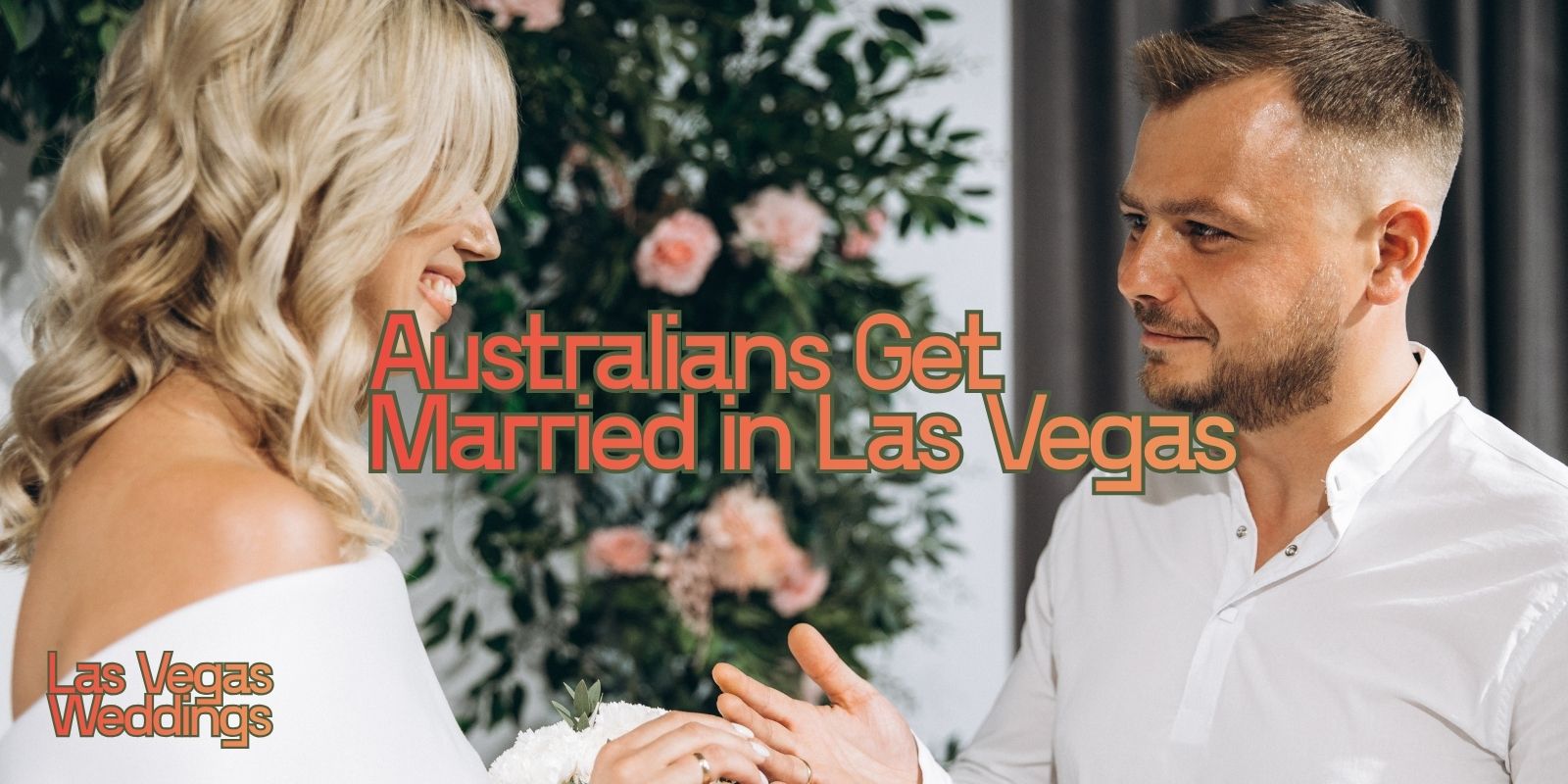Australians Get Married in Las Vegas: The Ultimate Guide
Australians Get Married in Las Vegas: Australians can legally marry in Las Vegas and—if the ceremony is valid in Nevada and meets the Marriage Act 1961 requirements—your marriage is generally recognized in Australia. Bring the right documents, know whether you need a CNI, and follow the steps below for smooth sailing.
Las Vegas isn’t just for whirlwind “I do’s” anymore. It’s the wedding capital of the world and an increasingly popular destination for Aussie couples who want a celebration that’s simple, stunning, and surprisingly stress-free. From fun and zany Las Vegas weddings to classic fairy-tale ceremonies, there’s a style (and budget) for everyone. This guide walks you through the essential legal steps, documents, and post-wedding recognition in Australia—plus practical tips to make planning from home a breeze.
Table of Contents – Australians Get Married in Las Vegas
- Why Australians Love Vegas Weddings
- Proving You’re Free to Marry
- Certificate of No Impediment (CNI)
- Certificates from Births, Deaths & Marriages
- Recognition of Your Vegas Marriage in Australia
- When a Foreign Marriage Isn’t Recognised
- Planning Tips from Australia
- Key Takeaways
- FAQ
- Your Aussie “I Do” in Vegas
Why Australians Love Vegas Weddings
Las Vegas hosts around 120,000 weddings each year—no surprise it’s called the wedding capital of the world. For Aussies, the draw is clear: flexible venues, breathtaking photo backdrops, and packages that simplify everything from flowers to photography. Whether you want Elvis, elegance, or a rooftop sunset, Vegas delivers options that feel easy yet unforgettable.
Crucially, Vegas suits different timelines. Planning months ahead is great, but elopement-style ceremonies are also common. That means less stress, fewer moving parts, and more time to enjoy your holiday. With the right documents and a clear plan, you can arrive, wed, and celebrate—all without overcomplicating the process.
Proving You’re Free to Marry
Many foreign authorities ask you to prove you’re legally free to marry. Australia’s official guidance sets out what proof may be required when marrying overseas. Start with the Smartraveller overview on proving you’re free to marry and check the sections on recognition in Australia and citizenship and marriage so you understand the full picture before you book.
Because each country sets its own rules, you should also confirm requirements directly with local authorities. For destination-specific questions (including what Nevada requires for Australians), contact the relevant mission listed via the Department of Foreign Affairs and Trade’s directory of foreign embassies and consulates in Australia. This helps you avoid last-minute surprises about which forms, translations, or notarisations you might need.
Certificate of No Impediment (CNI)
Some countries ask Australians to present a Certificate of No Impediment to Marriage. Smartraveller explains what a CNI is and how to obtain one here: Certificate of No Impediment (CNI). In short, a CNI confirms you’re not already married. Whether you need it—and where it must be issued—depends on the foreign authority’s rules.
DFAT can issue a CNI in Australia, but certain governments accept only CNIs issued in-country by an Australian mission. If you’re told to apply overseas, use DFAT’s list of Australian embassies and consulates overseas to find the right office. Australians Get Married in Las Vegas – In some cases, a CNI must also be legalised (authentication/apostille). Smartraveller’s page on notarial services explains how those processes work so your documents are accepted.
Certificates from Births, Deaths & Marriages
Alongside (or instead of) a CNI, you might be asked for documents issued by your Australian state or territory registry. These can include a Single Status certificate, a No Record Result, or a statement confirming there’s no record of a previous marriage. You can find your registry via the consolidated government page for Births, Deaths and Marriages registries.
Depending on your circumstances, overseas authorities may request extra proof—such as divorce orders, a deceased spouse’s death certificate, or your original birth certificate and passport. Australians Get Married in Las Vegas – Allow time to order official copies if you don’t already have them and double-check whether any document needs translation or legalisation before you travel.
Recognition of Your Vegas Marriage in Australia
Good news: while you can’t “register” an overseas marriage in Australia, most valid foreign marriages are recognised at home. The rules are set out in Australia’s Marriage Act 1961 (Cth). For statutory context, see the historical compilation hosted at ComLaw – Marriage Act 1961 (note: this link points to the legislation series for reference).
Two key tests usually apply: (1) your marriage must be valid where it was celebrated (i.e., Nevada’s law at the time), and (2) it would have been valid under Australian law if performed in Australia. The Attorney-General’s Department oversees policy on family law and marriage, including who can marry and which overseas marriages Australia recognises. Australians Get Married in Las Vegas – Keep your official Nevada marriage certificate—it’s typically accepted as evidence of the marriage in Australia, although you may need to follow state processes if you want your name changed on certain records.
When a Foreign Marriage Isn’t Recognised
There are important exceptions. A foreign marriage will not be recognised in Australia if, for example, one party was already married, either party was under the marriageable age (as defined in the Marriage Act 1961), the parties are too closely related under Australian law, or valid consent was missing because of duress, fraud, mistake, or incapacity. These aren’t mere technicalities—they’re core safeguards.
If your situation is complex (e.g., previous marriages, under-18 issues, adoption relationships, or name/identity discrepancies), obtain advice before you travel. For destination-specific documentation questions, consult the relevant mission via DFAT’s page for foreign embassies and consulates. For legal certainty on recognition back home, consider formal legal advice from an Australian practitioner.
Planning Tips from Australia – Australians Get Married in Las Vegas
Lock in the basics early: venue/chapel, photo package, and schedule. Many couples find a package the easiest path—coordinators handle flowers, music, and vendors so you can focus on the fun parts. If you want inspo or to compare ceremony styles, browse local providers and curated options on Las Vegas Weddings (great for ideas spanning elegant gardens to iconic Strip views).
Consider the logistics around your trip as well—guest travel, accommodation, and timelines for license pickup and the ceremony. If you’re bundling your big day with a holiday, look at seasonal pricing and proximity to your venue. To keep costs friendly, watch specials and packages; if you’re extending your stay, you might find helpful offers on hotel deals that align with your wedding dates and photo plans.
Key Takeaways – Australians Get Married in Las Vegas
- Yes, Aussies can marry in Vegas—and it’s often simpler than you think.
- Check whether you need a CNI, local registry certificates, translations, or legalisation.
- For rules and recognition at home, see the Marriage Act 1961 and AGD guidance.
- Keep your Nevada marriage certificate safe; you’ll use it as evidence in Australia.
- Plan early, book reputable providers, and confirm document requirements before you fly.
FAQ – Australians Get Married in Las Vegas
1) Do Australians always need a CNI for a Las Vegas wedding?
Not always. Requirements depend on the foreign authority. Start with Smartraveller’s explainer on the Certificate of No Impediment and confirm with the local authority handling your ceremony.
2) Where can I confirm country-specific rules and documents?
Contact the relevant mission in Australia via DFAT’s directory of foreign embassies and consulates, and check Smartraveller’s guidance on proving you’re free to marry.
3) Will Australia recognise my Vegas marriage certificate?
Generally yes, if the ceremony was valid in Nevada and meets Australian requirements under the Marriage Act 1961. Keep your certificate and seek legal advice if unsure; see the policy context via the Attorney-General’s Department.
4) What extra documents might be requested?
Depending on your circumstances: Single Status certificate/No Record Result from your state registry, divorce orders, a deceased spouse’s death certificate, or originals like your birth certificate and passport. Your registry list is here: Births, Deaths and Marriages registries.
5) Where do I get help overseas if a CNI must be issued in-country?
Use DFAT’s global listing of Australian embassies and consulates overseas and review Smartraveller’s notarial services page for legalisation (apostille/authentication) guidance.
Your Aussie “I Do” in Vegas
With thoughtful prep and the right paperwork, your Las Vegas wedding can be equal parts effortless and extraordinary. Confirm the documents you need, book a package that fits your vibe, and leave room for joy—the Strip has a way of turning simple plans into unforgettable memories.
From Elvis serenades to luxe garden vows, Vegas is ready when you are. Gather your proofs, set your date, and start picturing those post-ceremony photos under the neon sky. Your love story’s next chapter is just a flight—and a little paperwork—away.





